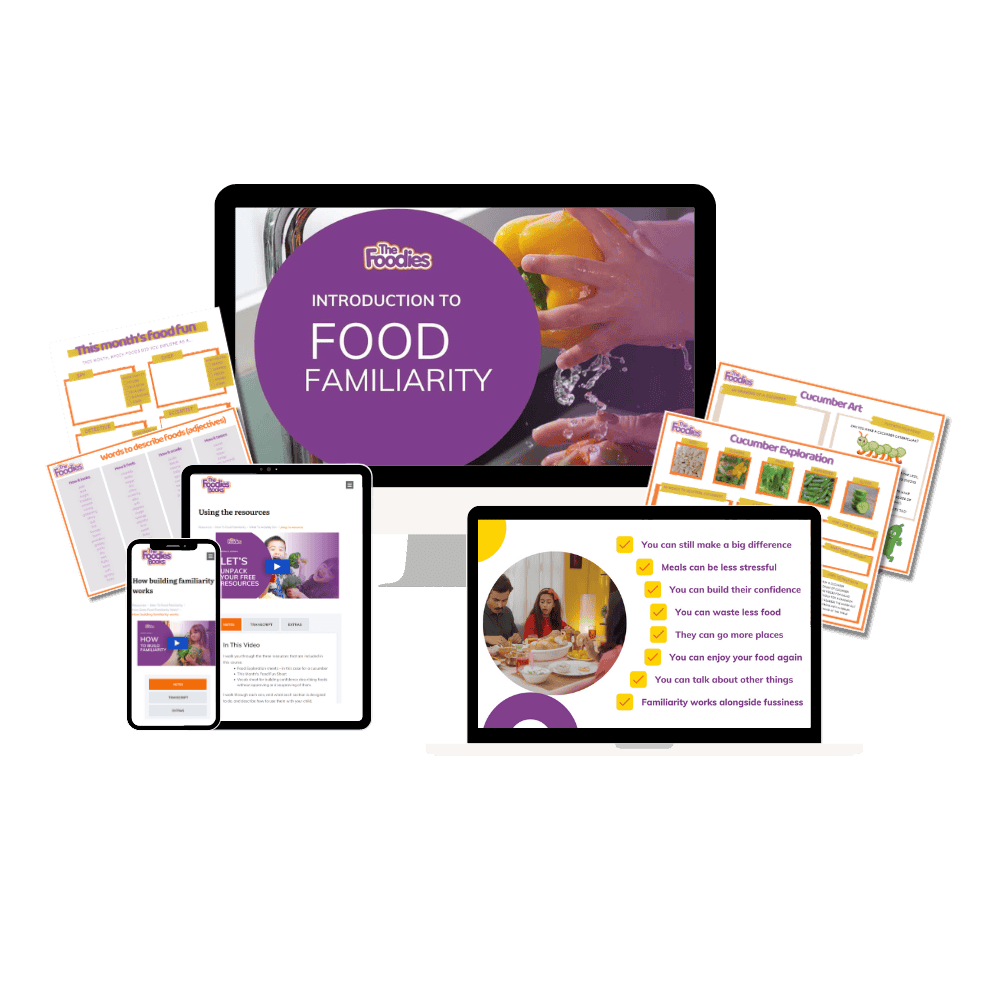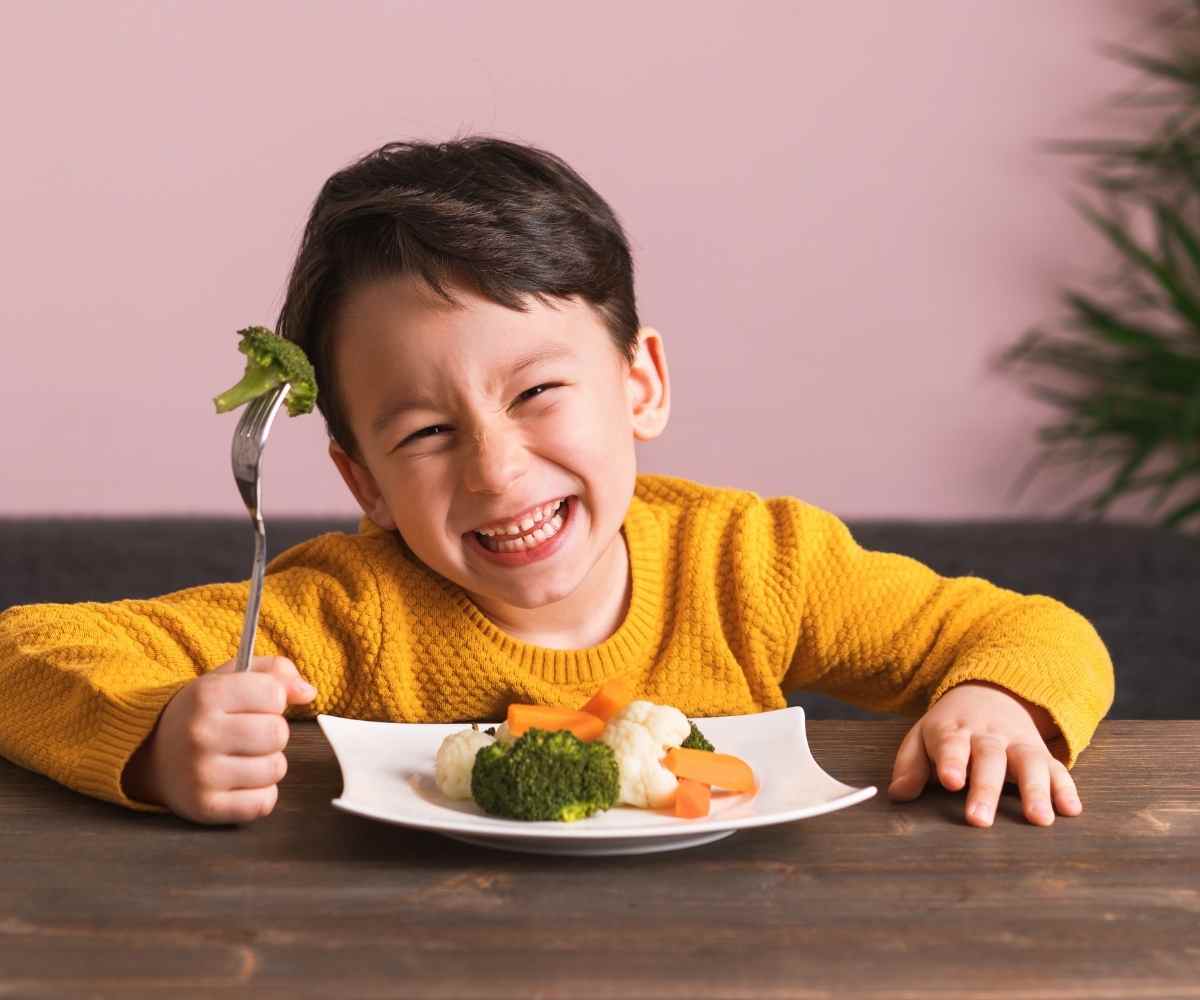No products in the basket.

Introduction to Food Familiarity
Find out why it's not your fault if your child is struggling to eat their fruit and veg.
Learn how to build their confidence away from the table, and reduce mealtime battles.
Get started straight away with practical, easy printable activities.
How this can help you
Understand some of the reasons children reject new foods, and the science on how to help your child.
Find out why the meal time tricks and hacks that other parents told you about might not be working.
Download fun printables with repeatable activities for your child to explore food away from the table.
Get loads of EASY ideas to build confidence in bursts of 1-2 minutes, minimal waste and no pressure!
Here’s What You’ll Get
This course is made up of a series of eleven short videos taking you through the "Why?", "What?" and "How?" of building your child's confidence around fruits and vegetables in the long term. It includes some printables for activities to get your child started and instructions on how to adapt them for your child and your family lifestyle. In just under 90 minutes total, you will come away more knowledgeable about the science of how children learn to accept vegetables, more reassured about your ability to help them, and more equipped with practical ways to get started. You will also learn how to figure out when you might need some more personal help and where to find it.
Here’s What You’ll Get
This course is made up of a series of eleven short videos taking you through the "Why?", "What?" and "How?" of building your child's confidence with fruits and vegetables in the long term. It includes some printables for activities to get your child started and instructions on how to adapt them for your child and your family lifestyle. In just under 90 minutes total, you will come away more knowledgeable about the science of how children learn to accept vegetables, more reassured about your ability to help them, and more equipped with practical ways to get started. You will also learn how to figure out when you might need some more personal help and where to find it.
Is This For You?

Longing for Mealtime peace
If you're one of the 41% of parents who struggles to enjoy your own meal because of your child's fussiness, and you want to just try something less pressured so that mealtimes aren't so fraught.

longing to achieve five or more a day
If you're one of the roughly 72% of parents whose child doesn't manage Five A Day and you're particularly looking for ways to increase their acceptance of fruit and vegetables in the long term.

longing to set your child up for life
If you're one of the 88% of parents who prioritises your child eating healthily, and you're ready to look at building their confidence for the rest of their life, rather than just fixing issues at next meal.
If it's good, why is it so cheap?
I've been working in and around school food for a long time so i know that children from all backgrounds struggle with food.
I didn't want to make something helpful and then have it so expensive that only wealthy people can justify it. Food is expensive right now!
Plus this is absolutely not a magic wand that will instantly fix everything. You're going to have to apply the things you learn. And this is also not dietary advice, you will need to see a professional if that's what you need.
I'm just trying to make it a bit easier to start trying something different.
What this course WON'T do
Make your child eat their vegetables TONIGHT
It will instead show you how to help your child feel more confident about accepting new foods in the long run.
Give you a magic hack that works instantly
It will instead give you practical two minute activities that can help build up your child's confidence for the long term.
Give you advice about what your child eats
It will instead focus on the skills that lead up to eating. It will also signpost you to professional help if you do need individual advice.
Teach you to pressure your child effectively
It will instead show you the science of why pressure doesn't help, and give you a viable and much less stressful approach.
Who created this course?
Hi! I'm Joanne Roach.
I'm the author and creator of The Foodies Books and The Little Foodies Club. I have a background in Early Years childcare development and school food provision, and have been helping children to grow vegetables at home and in school for over 17 years.
I create educational materials, workshops and products for parents, grandparents and educators who want to engage and educate children with fruits and vegetables.
FAQ
For a starter it's not a hack, trick or tactic. We've all tried loads of those and this course actually explains why loads of them don't work long term. Instead this course explains the reasons behind reluctance to eat fruit and veg, and shows how to tackle that in a long term, sustainable, achievable way over time. It takes the pressure away from the table, so no more trying 'something your father-in-law told you' at your next meal and hoping it doesn't end in tears or gritted teeth.
This course is purely and simply about building up your child's familiarity with fruit and veg in service of your overall aim of raising a person who can go into the world confident about their own ability to deal with food, rather than finding that one silver bullet that will make them eat that one bite of broccoli today.
You shouldn't! I'm not presenting my opinion here. You will see a tiny portion of the wealth of scientific studies that show that building familiarity with foods can be helpful for overall acceptance of fruits and vegetables. I'm not giving dietary advice. I am not qualified to do that even if I wanted to (although I will share how to find someone who is qualified if professional one-to-one support is what you need). I have been working with schools and day nurseries and families for over 15 years, creating books and resources and activities that help children become more confident around fruit and veg in general. That's my area of knowledge.
If your child has specific medical or developmental needs which means you probably need professional support, they may well ask you to do some of this familiarity work anyway, and then you have a bunch of ideas up your sleeve. And if your child doesn't need professional support, this can help to widen their range of accepted fruit and veg and build their confidence.
So you don't need to believe that this will fix everything, that's not what I am offering! This will just give you some knowledge to help you to not do some of the old fashioned ideas that could backfire on you, and give you some different tools and activities to start building confidence over time, with or without extra help.
Sorry, no, I am not qualified to give nutritional advice about what your child eats. My background is in providing educational resources to help to build children's confidence with food, especially fruit and veg. However I do explain in the course how to go about looking for qualified and reputable additional help if that's something you think you need.
If this answer means that you don't think you want to do this course, that's fine! I don't want to waste your time or money. If you want to see a professional, start by talking to your GP as they will have the overall picture of your child's development and can refer you to someone appropriate.
Nope! This is not a free workshop to promote a product. It's fair enough when people give you some free education and then ask if you want to buy their more in depth thing. It's not ok if people charge you for something and then still don't give you anything you can use in real life.
Does this course tell you everything that has ever been said about fussy eating and building familiarity through exposure to foods? No. Honestly, if it did, would you want to read and watch hundreds of hours of scientific research papers about that? Or do you want enough knowledge to understand why this might be helpful and then some practical ways to start? If you need more certainty and detail for your own family, then definitely see a professional who will be able to take all of your factors into account.
This course gives you a good introduction to why some of the more common tactics for fussy eaters don't work. It tells you some of the science as to why building familiarity works. It gives you loads of links if you actually do want to go and find out more in your own time. Then it gives you some printables to use and loads of individual practical ideas to get you started.
I'm absolutely not going to say these ideas will definitely work for every child in every family, all the time, regardless of circumstance. I'm not sure what anyone could say that about! What I am prepared to say is that the underlying principles behind building familiarity are sound and backed by peer reviewed studies that tried them out in different ways and in different situations. Those studies showed that it could help children's acceptance of fruit and veg overall. They didn't say they would make every child eat every food!
So even though the overall ideas are sound, children are super individual and you are the only one who knows your child and your family dynamic inside out.
If you're getting professional help with your child's eating, then you should obviously run the ideas by the person you are consulting because they might have a plan for tackling things in a specific order. If your child has special needs, then you may need to adapt the ideas or ask advice from someone who understands their development. A lot of the time these low pressure tactics are the ones that other professionals recommend to take pressure away from the table, so this is just a way to bank a bunch of practical ones you can use without having to dream them up. There just may be very specific situations where mental or physical issues mean that a different approach would work better so then you should obviously go with the expert advice.
This course will not give you a magic map of what to do, in what order, to get to a destination of "toddler has accepted these ten vegetables".
What it will do it tell you how to weave tiny moments of confidence-building with foods into everyday life in a way which doesn't take lots of time or money to achieve, doesn't require you to suddenly become a different type of parent, or expect your child to suddenly lose all of their anxiety overnight. You won't need special equipment or a big kitchen or a veggie patch. Just a willingness to look at things a little differently and in a lower pressured way.
The course itself has 11 videos totalling just under one and half hours. I talk fast and there's a lot of information on screen so you probably won't be able to go over 1.25 maybe 1.5 speed. There's a transcript if you're a reader not a listener, but you will still want to look at the slides on screen. to get some of the information. So realistically 90 minutes is about right to actually DO the course.
Then there are the printables to work with, I walk through how to use them during the course so you don't have to find extra time to figure them out. They are really for your child to work with, but if your child is very young you will obviously need to put a little more time into helping than if they are old enough to crack on with things independently. But nothing on the printables should take more than 15 ish minutes and most of the ideas are more like 1-2 minutes each.
The idea of this course is actually not to have a To Do list of things to achieve, but rather a way to incorporate helping your child into the everyday running of your home in tiny little bursts. So if I were trying to mentally add up how long it would take if you manically did every single thing on the printables all in one gruelling sitting, it would probably end up taking around an hour. But in reality it will be a bunch of 30 second, 2 minute, 5 minute bursts throughout the month. Flexing down when you're busy, and up when you have more time. Just like the rest of the way we run our homes.
So basically, you will watch and absorb the videos, print off the printables, start off with the suggestions I give you in the final video, and then use the printables to remind you and your child to weave little moments in here and there. I will email you at regular intervals to give you a nudge with two minute suggestions for the current week. Unless you hate that, in which case I will stop! You can genuinely make this as big or little as you like, because this is a long term, low pressure project.
Yes! If they would both / all benefit from the printables you can print multiple copies, or they can work together. If some of your children are confident with food and others aren't, then the low pressure activity ideas are general principles that will work for everyone in the longer term because they're all about building confidence with food for their life ahead.
Because the subject of what a child does (or does not) eat is not my area. If you need help with the actual nutrition your child eats, you should see a registered dietitian or properly qualified registered children's nutritionist. I'll give you pointers how to do that.
I work on familiarity because I like dealing with practical ideas and science based stuff. Over 17 years ago I read a scientific study about how children can become more accepting of foods if they have more exposure to them, even through seeing pictures of them and without eating them. Because I worked with children, had young children myself and had a veggie patch, I had an idea to create children's books about vegetables to build familiarity in kids who didn't have a veg garden. They sold over 40,000 copies and in the meanwhile teachers and childcarers asked if I had any resources to go with them, so I started making some. It snowballed into a business, so I have been making educational resources about vegetables ever since! I have also worked in school food provision, and trialled a bunch of ideas to build up children's familiarity both on and off the plate. I have been growing food for over 20 years, and am always interested in the science of food in general. And although I have never wanted to qualify to work with individuals, or get involved in the dietetics end of the equation, I love working with dietitians who have a no pressure approach to find new ways to collaborate with them.
So the answer is that building familiarity is what I have the experience in, where I understand the science the most and where my own skills are best applied. I will leave the advice about individual children's eating to the wonderful professionals who have spent their time being expert at that. I stick to the practical familiarity ideas that can be adapted by each family in their own way, so that when professionals recommend to a parent to try more no pressure interactions away from the table, I can suggest some without the parent having to come up with ideas. And I give those ideas to parents who don't work with a professional but want to do best practice anyway.
Basically I love nerding out about vegetables and fruit and I love helping kids to see how fun and varied and interesting (and delicious) they are, whether they eat them or not, so they become more knowledgeable around veggies in their own unique way.
Hope that makes sense!
Yes absolutely, this requires no extra food spend at all*, and should generally result in less food being wasted rather than more.
(*technically you should buy one cucumber, so if you live in a household that never buys cucumbers, then you will have to buy an additional cucumber!)
start now for long term change
Get started building your child's confidence today
Watch the short videos.
Download the printables.
Get started straight away.
